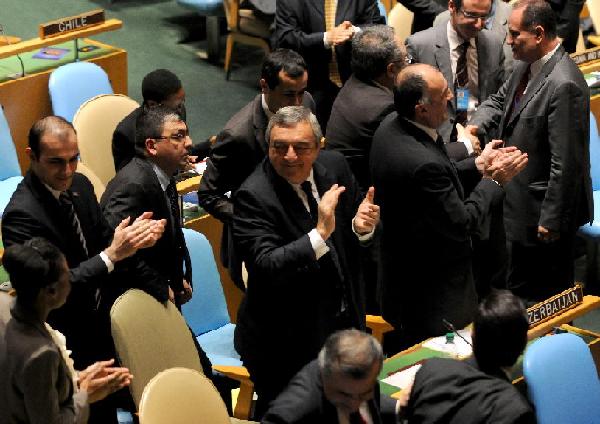5 new members elected to UN Security Council
 0 Comment(s)
0 Comment(s) Print
Print E-mail
Xinhua, October 25, 2011
E-mail
Xinhua, October 25, 2011
The UN General Assembly on Monday elected Azerbaijan to a two-year term on the UN Security Council, making it join Pakistan, Morocco, Guatemala and Togo as the five new non-permanent members of the most powerful UN body.
 |
|
Representatives of Azerbaijan celebrate after it won its bid for Security Council membership in New York, the United States, Oct. 24, 2011. The UN General Assembly on Monday elected Azerbaijan to a two-year term on the UN Security Council, putting the final touch on the election of five new non-permanent members to the most powerful UN body. [Xinhua] |
Nassir Abdulaziz Al-Nasser, president of the UN General Assembly, announced the outcome of the election at the end of the 17th round of voting, which started on Friday.
"I congratulate the states which have been elected to the Security Council," Al-Nasser said.
The new council members will serve from Jan. 1, 2012 to Dec. 21, 2013 to replace the five outgoing members of the Security Council - - Bosnia and Herzegovina, Brazil, Gabon, Lebanon, and Nigeria, whose term of office expires on Dec. 31, 2011.
In the Friday voting, Pakistan, Morocco and Guatemala were elected in the first round, while Togo won the election in the third round.
To win election, a country must receive a two-thirds majority of those countries present and voting, regardless of whether or not they are the only candidate in their region.
UN member states on Friday voted in the General Assembly by secret ballot for five non-permanent seats divided by geographical grouping -- three from the Africa and Asia-Pacific grouping, one from Eastern Europe, and one from Latin America and the Caribbean.
In the Africa and Asia Pacific category, two new members in this election cycle should be from Africa and one should be from the Asia-Pacific region, based on a long-held norm.
The candidates vying for two African seats are Morocco, Mauritania and Togo. The states competing for the single available Asia-Pacific seat are Pakistan and Kyrgyzstan. Out of these candidates, Kyrgyzstan is the only nation never before to have served on the Security Council.
For the one seat to be filled from among the Eastern European states, Azerbaijan, Hungary and Slovenia have declared their candidature, and Azerbaijan has never before been a member of the Security Council.
Under the UN Charter, the 10 non-permanent members are elected by the General Assembly. The regional groups for two-year stretches, with five elected in October each year, fill 10 of the Security Council's 15 seats.
Azerbaijan and Slovenia were locked in more than 10 rounds of ballots since Friday in a tough competition for a seat for the East Europe on the 15-nation Security Council.
Azerbaijan won 155 ballots on Monday in the 16th round of votes since the 193 members of the UN General Assembly began to cast their secret ballots to elect five new non-permanent members of the 15-nation Security Council.
Slovenia, which won 77 votes in the 16th round of voting, announced its decision on Monday to withdraw its candidature for the Security Council membership, making Azerbaijan unopposed in the last round of voting.
In the final round of ballots, Slovenia got 13 votes and Hungary, 1. Hungary was also a candidate for the single East Europe seat on the Security Council, but it was knocked out in the earlier round on Friday.
The candidates are locked in a tough competition as they see a Security Council seat can give them a stronger voice in dealing with the issues concerning the international peace and security.
Under the UN Charter, the Security Council has the primary responsibility for the maintenance of interactional peace and security.
The Security Council is composed of five permanent members -- Britain, China, France, Russia and the United States, and 10 non- permanent members that are elected in groups of five to two-year terms on the council.
The presidency of the council rotates between the countries serving in the peace and security body on a monthly basis based on the English-language alphabetical order of the countries' names.






Go to Forum >>0 Comment(s)